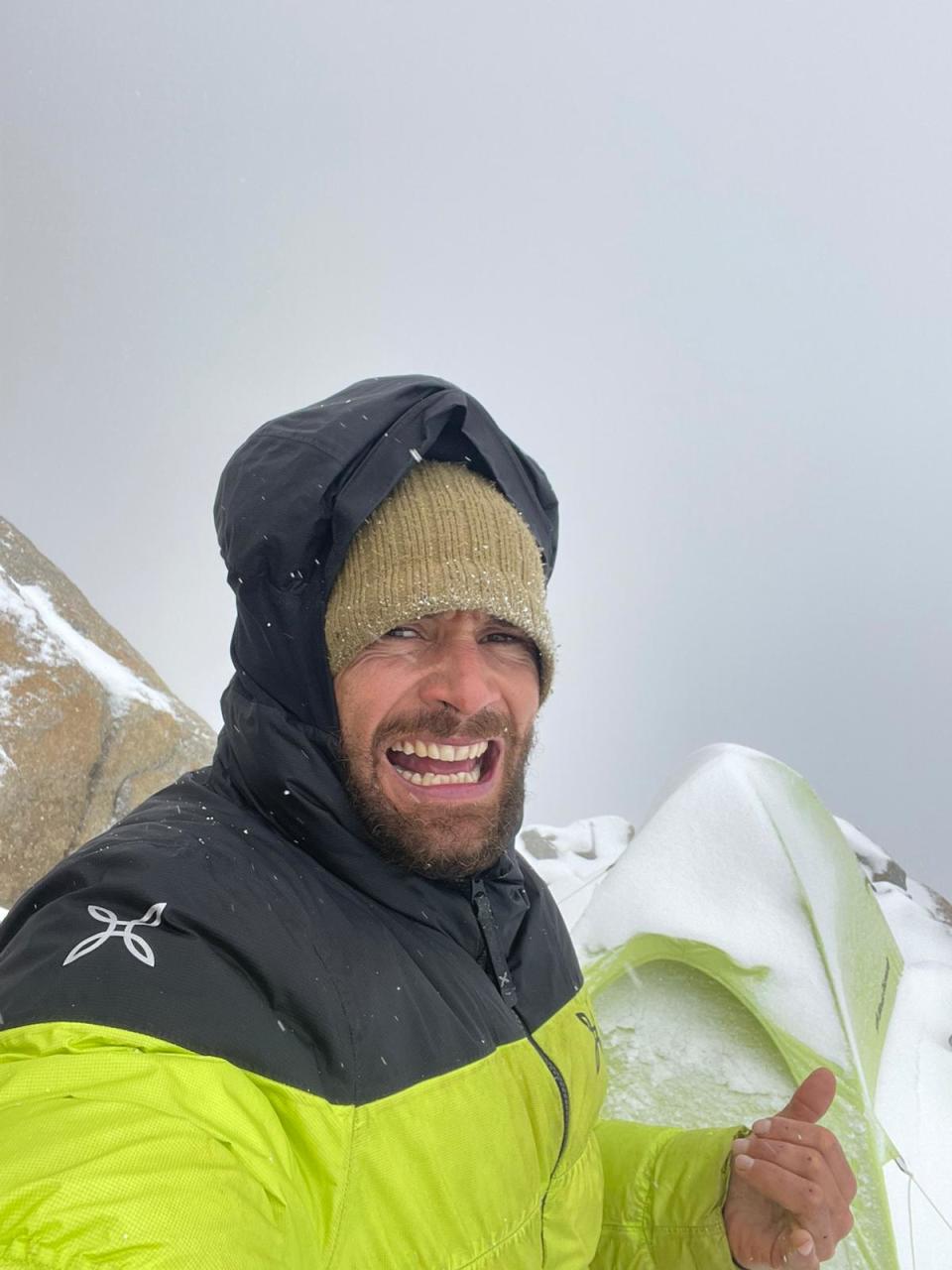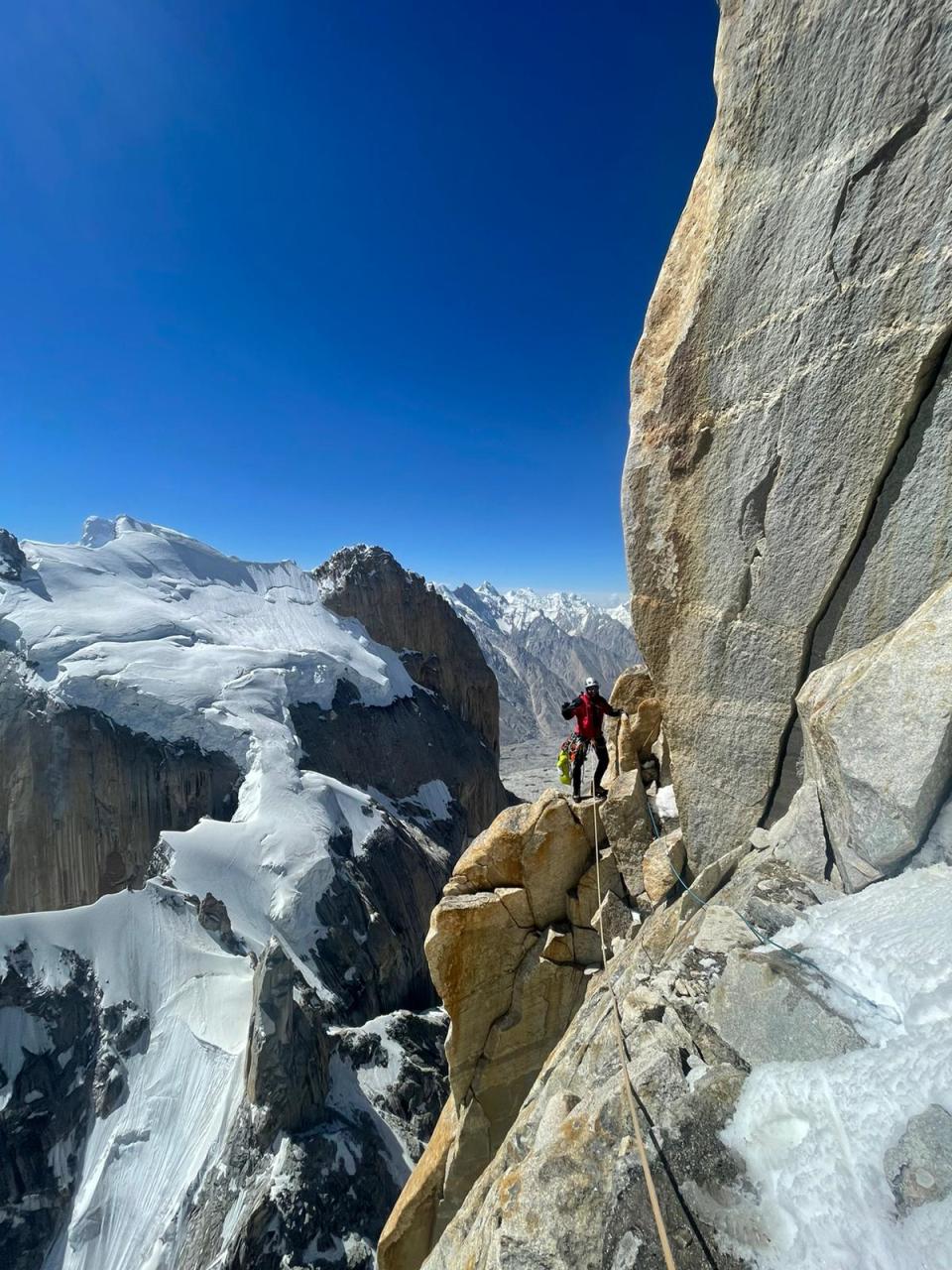Edu Marín’s Second Ascent of Eternal Flame Was a Family Affair
This article originally appeared on Climbing
If you mention big wall climbing to most climbers, Pakistan's Nameless Tower often bulldozes its way to the forefront of the mind. The tower's 2,100-foot route Eternal Flame is considered among the hardest big wall routes in the world. Before this month, only Alex and Thomas Huber had made a free ascent of the line, which features difficulties stretching up to 5.13a/b, perched at a whopping 20,000 feet of elevation.
This July, however, after a two-month expedition and two weeks spent on the wall alone, Catalan climber Edu Marin has made the second free ascent of the route. Marin freed all pitches individually, supported by his father Francisco and his brother Alex, both of whom summited with him on July 20.

Though he only made his first attempt on Eternal Flame in 2021, Marin has been inspired by this route since he was a child.
When he was 12 years old, his father gave him a book about legendary German climber Wolfgang Gullich, who made the first ascent of the route in 1989 with Kurt Albert, Christof Stiegler, and Milan Sykora, aiding at A2 and free climbing at 7b+ (5.12c).
"I don't have many inspirations, but Wolfgang Gullich was and is one of those," Marin told Climbing following his ascent. It's not surprising because, like Marin, Gullich was known more for his nails-hard sport sends than his big wall climbs. The pioneering German was responsible for single-handedly pushing sport grades from 8b (5.13d) up to 9a (5.14d), four consecutive grade increases save for Ben Moon's Hubble (8c+/5.14c).
So for Marin, Eternal Flame isn't just a route. "It's a piece of history, heritage," he said. "It's a piece of art crafted by the legends of the climbing community: Wolfgang Gullich, Kurt Albert..." The route's name is fitting, Marin said, because like a torch, "this route is something passed down from the previous generation, a piece of their story." For him in particular, it was also a chance to follow in the footsteps of a childhood hero.
So last year, when contacted by a group of friends heading to Pakistan to try the route, he jumped at the opportunity. Unfortunately, the team Marin partnered with was more interested in summiting the tower via Eternal Flame than in freeing the line. The experience on the route was enough to set the hook, however, and Marin returned with the two climbers he trusts the most in the world: his father and brother.
"We know each other better than anyone else," he said. "It's really easy being in bad situations with them. When it's tiring, cold, wet, these people, my family, always are smiling and positive, no matter what shitty situation we are in. We had a lot of problems [on this route], but we never once thought to give up. So, I chose this team not just because they are my family, but because they are extremely strong, both body and mind. We have the same values, the same passion for the mountain."
The team may have been a tight-knit trio, but it certainly wasn't the most experienced group Marin could have chosen for a dangerous, difficult, high-altitude climb on a remote big wall. Eternal Flame was Alex's first big wall, and their father Francisco, though an experienced climber, is 70 years old.
Despite a few difficulties with acclimatization (the route begins at an elevation of 16,400 feet and the tower's summit is circa 20,500 feet), Marin's father was soon leading the party in stoke. "Once my father acclimatized, he was a machine," Marin said. "Every morning he came to the tent and woke me up, 'Hey Edu, coffee is ready, come on man let's go, let's go!'"
"His attitude was crazy. His positive vibes and energy, it was the stuff of legends. Sure, I was the one who climbed all the pitches free, but my family was a huge part of that achievement. My father is 70 years old and he was out there pushing hard every single day. My brother was on his first big wall and it was one of the hardest in the world... It's inspiring to be there with these guys."
The hardest part of the whole project, Marin said, wasn't the difficulty of the pitches, but the sheer amount of logistical effort the team had to put in to make it all possible. "We were working there for a month just to set the route," he said. "We put up 800 meters (2,600 feet) of static rope."
Other teams who arrived for an attempt on the line (including Babsi Zangerl and Jacopo Larcher, who freed Eternal Flame shortly after Marin) were able to make use of his extensive efforts to set the route. "All the teams that came later didn't put up ropes--[they] just waited for the window and when the window arrived, came to the wall and made a fast ascent," he said. "But hey, it's the life. I was glad to arrive before the other teams and do all the work myself, with my father and brother. Sure, after that you feel more tired to climb the route, but I was still able to do it."
The effort wasn't without a few hiccups and nerve-tingling moments. Early on in their effort, the team's base camp was nearly struck by an avalanche in the middle of the night. "Much of our camp was flying through the air," Marin said. "We lost food, ropes, clothes, it all fell like 200 or 300 meters to the glacier below. The next day we had to come down and find all the pieces."

Moments like this made Marin question the whole effort, not because of the risk to himself, but because of the risk to his father and brother. "I had a lot of doubt if I was doing the right thing, being in the mountains with my father and brother," he admitted. "I had the responsibility to be safe with my family and come back home together."
It was tough to wrestle with that question, especially after close calls like the avalanche near their base camp, but "in the end, I had to realize that they accepted the risk. They chose to play the game with me."
Like many high-altitude climbs, the effort was as much a waiting game as anything else. The team managed to fix ropes up to the "Snow Ledge" at 19,700 feet in late June and early July, freeing this initial portion of the route between July 1 and 4. On July 4, however, a significant weather system rolled in. Instead of descending with his father and brother, Marin opted to stay on the wall alone and wait the weather out. " Every person plays this game in different ways," he said, "and I just wanted to do the route with this philosophy, without going down at any point."
He ended up spending a dozen frigid nights alone on the wall, at an elevation nearly on par with the summit of Denali. "It was really cold and windy every night," he said. "I went many nights without sleeping hardly at all, and it was quite risky because after two weeks at altitude I worried I would be too weak to climb the hardest pitches." (The route's crux had yet to be completed.) "It was hard to be alone for 12 days up there," he said, "but I chose to do this because it's [a] more ethical way to climb."
The solitude, stuck in the tent for days on end at 20,000 feet, was another crux of the endeavor, Marin admitted, but "my energy, positive vibes, and motivation all came from knowing that my family was there to support me. When I thought back on that, I got the energy to keep going."
Marin kept in shape during that solitude, training on fingerboards in his camp on the ledge, meditating to keep his stoke high, and staying in touch with his dietician and doctor, eating every three hours and hydrating as much as possible. After nearly two weeks, the weather broke, his father and brother jugged back up, and they blitzed the remainder of the route. "I was 28 days on the route," Marin said, "but we completed the climbing quite fast, in only five days or so total."
Of the crux climbing, Marin added, "It's really bouldery, with little feet, little hands. Climbing that difficulty at that altitude and exposure is truly amazing, something extremely beautiful." In fact, he believes the pitch to be even harder than the Hubers graded, at 8a (5.13b), and noted that when he raised this question to Alex Huber last year, the latter agreed that he wasn't quite sure if 7c+/5.13a was an accurate grade. "I am thinking this pitch would be more 8a for sure," said Marin. "In my opinion, it's a major difference."
Despite his achievement, Marin said he felt his own accomplishments may pale in light of his father and brother's performance. "I don't know what I am most proud of," he said, "That I made the second free ascent and perhaps became [the] first person to free of all the pitches, or that my father is 70 years old at the summit, or that my brother is completing his first big wall!"

For exclusive access to all of our fitness, gear, adventure, and travel stories, plus discounts on trips, events, and gear, sign up for Outside+ today.

